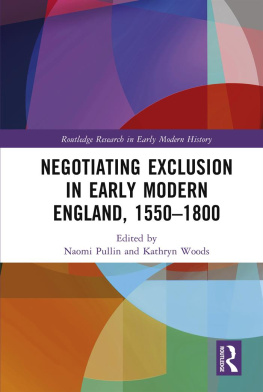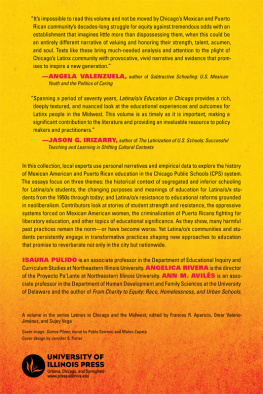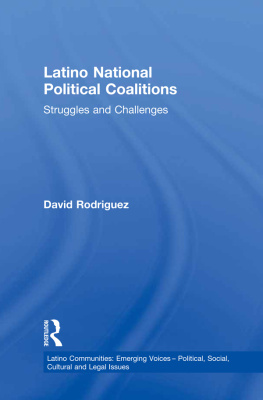NEGOTIATING LATINIDAD
LATINOS IN CHICAGO AND THE MIDWEST
Series Editors
Frances R. Aparicio, Northwestern University
Omar Valerio-Jimnez, University of Texas at San Antonio
Sujey Vega, Arizona State University
A list of books in the series appears at the end of this book.
NEGOTIATING
LATINIDAD
Intralatina/o Lives
in Chicago
FRANCES R. APARICIO
2019 by the Board of Trustees
of the University of Illinois
All rights reserved
Library of Congress Cataloging-in-Publication Data
Names: Aparicio, Frances R., author.
Title: Negotiating Latinidad : intralatina/o lives in Chicago / Frances R. Aparicio.
Description: Urbana : University of Illinois Press, 2019. | Series: Latinos in Chicago and the midwest | Includes bibliographical references and index.
Identifiers: LCCN 2019024420 (print) | LCCN 2019024421 (ebook) | ISBN 9780252042690 (hardcover) | ISBN 9780252084539 (paperback) | ISBN 9780252051555 (ebook)
Subjects: LCSH: Hispanic AmericansEthnic identityIllinoisChicago. | Hispanic AmericansRace identityIllinoisChicago. | Racially mixed peopleRace identityIllinoisChicago. | Identity (Psychology)Social aspects. | Chicago (Ill.)Ethnic relations. | Chicago (Ill.)Race relations.
Classification: LCC F548.9.S75 A63 2019 (print) | LCC F548.9.S75 (ebook) | DDC 305.868/073077311dc23
LC record available at https://lccn.loc.gov/2019024420
LC ebook record available at https://lccn.loc.gov/2019024421
Contents
(Elena, Mariana, Jos, Sara, Daniel, Vivian)
(Daniel, Mario, Mara Isabel)
(Marisa, Enrique, Marcos, Stacey)
(Karen, Mara Isabel, Jos, Carolina)
(Diana, Milagros, Silvia, Linda)
(Paco, Ignacio)
(Diana)
To all Intralatina/os, past, present and future
Latinidad in the Flesh
An Intimate Preface
In 1974, when I first arrived in the continental United States from Puerto Rico as a nineteen-year-old freshman at Indiana University, I had no idea that my life would be profoundly transformed by the spaces of emerging Latinidades. My childhood had not prepared me for my future friendships and intimate relationships with Mexican-Americans and Chicanos, communities that were more alien to me than Anglos. When I went on to graduate school at Harvard University and met Henry Sunny Aparicio, my life as a young Puerto Rican woman diverged from the path my parents expected. Instead of completing my degree and returning to the island to marry and have children, I moved with Sunny into a small apartment in Cambridge and we initiated our family life as young intellectuals and as an Interlatino couple. Sharing everyday life with Chicana/os from California during my first teaching job at Stanford University; my in-laws in El Paso, Texas; and numerous other Chicana/o colleagues in the academy, my sense of belonging as a Puerto Rican woman was clearly disrupted and expanded. I began to reflect on what it meant for me to have fallen in love with a Chicano from Texas, to have had a MexiRican daughter, and to have become family to the Aparicios, whom I learned to love as my own. When I completed my doctorate in 1983, it almost seemed natural for me and my family to move to California, where I would be transculturated by the history, rich cultural traditions, and the critical politics of Chicanos and Chicanas. At Stanford University, I had the honor of team teaching with Professor Toms Ybarra-Frausto the campuss first course on Chicano-Riqueo literatures and cultures. Toms was not just a colleague but became our compadre , as we invited him to become my daughter Gabys padrino when we celebrated her bautizo in a setting in which we were beginning to build family and friendships. Ironically, and exemplifying what I have termed the intralatino mediations of identity (Aparicio 2009, 630), Toms also connected me to NuyoRican scholarship. Toms introduced me to Juan Flores, Rina Benmayor, and the archival treasures at the Library of the Center for Puerto Rican Studies at Hunter College. Through these expanding social affiliations and friendships, my critical understanding of Chicanos and Chicanas and other Latina/o communities grew. When Sunny died in 1985 from a self-inflicted wound in the rolling hills behind Stanford, I never felt alone. Instead, I realized that my family was no longer exclusively my biological family from Puerto Rico but my mother-in-law, Ofelia, who lost her son; my sister-in-law, Marsha, who lost her brother; and all the other relatives and friends, like Gladys White and Susana Chvez-Silverman, who had loved Sunny despite his psychological struggles. My family also now included some of my colleagues in California who mourned with me and who witnessed my transition into other chapters in my life.
My years in Tucson, Arizona, cemented the Latinidad that I was beginning to construct for myself and Gabriela. While the local Mexicans were rather insular and did not embrace my presence in their midstWhat is a Harvard-educated Puerto Rican woman doing here?it was in Tucson where I experienced life on the border, literally speaking. I learned about the violence exerted against border crossers; about the vigilante groups claiming land that their settler colonial ancestors stole from the indigenous communities; and about the Central American Sanctuary Movement, the revolutionary music that was emerging from Nicaragua and El Salvador, and the complicity and participation of the US government in the civil wars in Central America. I also learned about the internal differences and differentiations behind the Mexican rubric: in my classroom, I witnessed the tensions and struggles for power among the elite Mexican foreign nationals, working-class Mexican-Americans from Arizona, and the more radical Chicana/os who studied with me. I also realized that hidden behind the hegemonic Mexicanness of the Southwest, my classes also included Cubans, Puerto Ricans, Nicaraguans, and other Central American students, although these nationalities remained overshadowed by the dominance of Mexicanidad in the region. It was in Tucson as well where I met labor organizer and Chicano media practitioner Julio Csar Guerrero, whom I married in 1990 and who became the father to my second daughter, Camila Margarita. After some years of commuting in between Illinois and Arizona, I finally left the Southwest and settled in Ann Arbor, Michigan, where Julio and I raised our family and where I taught at the University of Michigan for a decade.
Michigan was exciting, amazing, and exhausting. The intellectual culture on campus fostered my interdisciplinary thinking and allowed me to engage salsa music within the framework of cultural studies. Most significantly, returning to the Midwest allowed me to situate myself as a Latina scholar who became more intellectually curious about what the region meant for my own scholarship, teaching, and family life. When Camila was a baby, I hired Salvadoran women for child care. This allowed me to enter the social world of this small community in Ann Arbor, a group of families who had relocated there as the result of the sanctuary movement. These women were strong, resilient survivors who worked hard to make good lives for themselves and their children. I owe much of my own scholarly success during the 1990s to Pilar, Lillian, and Angelina (names changed to protect them), all of whom aided me in my motherly duties and who became comadres to me in the process. It was an honor for me to have been present in Angelinas labor for her youngest daughter, whom she named Camila after my daughter. When one of Angelinas sisters needed support and protection from her abusive partner, a colleague and I arranged for her to go into a shelter away from Ann Arbor with her two small children while the police arrested her partner. He was later deported to El Salvador, and she was approved for residency. I am hopeful that her life circumstances have significantly improved. Simultaneously, Pilar reminded me of my own privilege as a US citizen when she shared with me that her trauma from the civil wars in El Salvador would be triggered every time she saw my car, a gray Jeep Cherokee that I had bought before moving to Michigan. That was the same model used by the death squads in her country. These specific moments with them are still seared in my soul, reminding me of the ways in which community is made. While I have lost touch with these wonderful women, they remain close to my heart.








